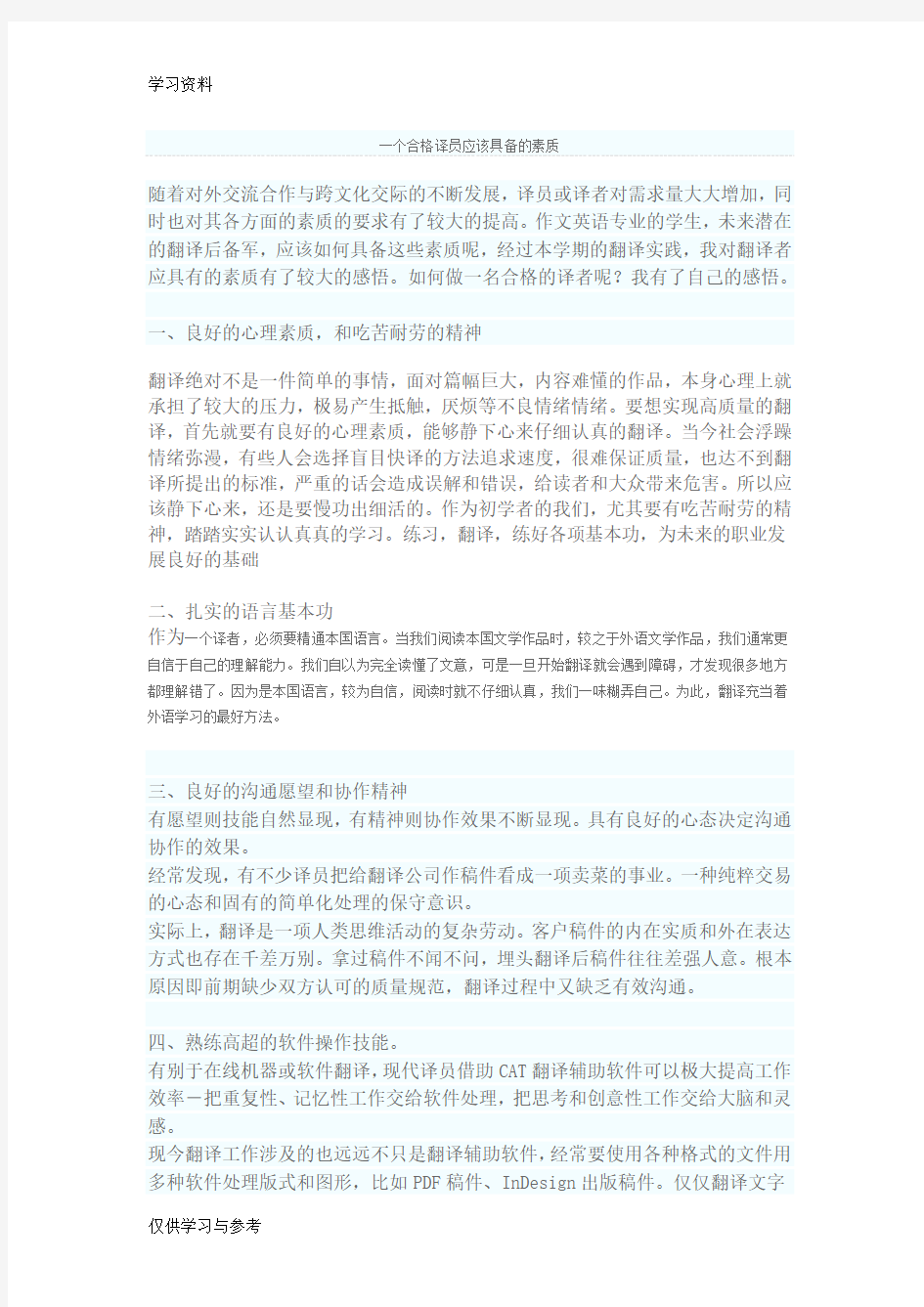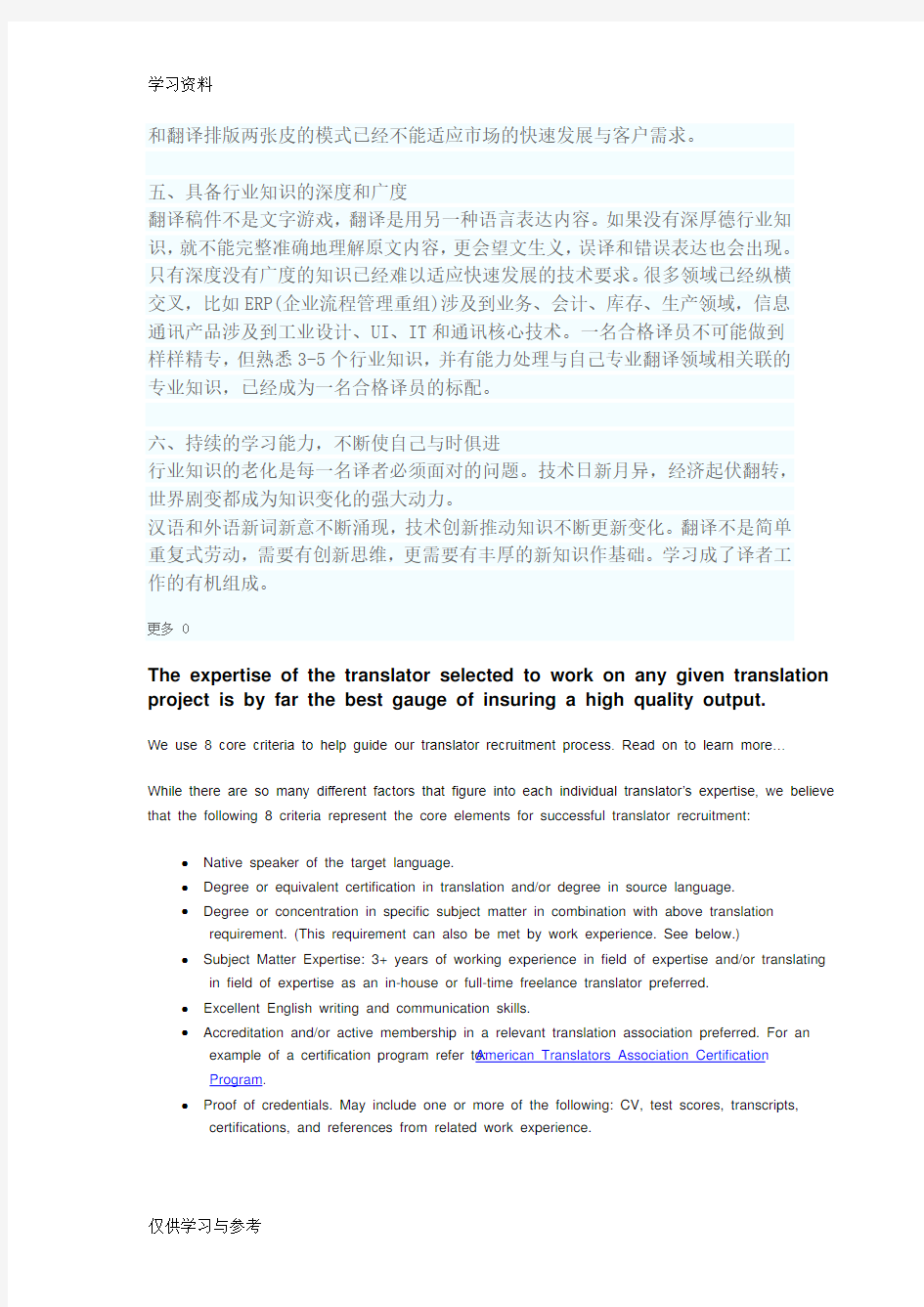一个合格译员应该具备的素质教学文稿


随着对外交流合作与跨文化交际的不断发展,译员或译者对需求量大大增加,同时也对其各方面的素质的要求有了较大的提高。作文英语专业的学生,未来潜在的翻译后备军,应该如何具备这些素质呢,经过本学期的翻译实践,我对翻译者应具有的素质有了较大的感悟。如何做一名合格的译者呢?我有了自己的感悟。
一、良好的心理素质,和吃苦耐劳的精神
翻译绝对不是一件简单的事情,面对篇幅巨大,内容难懂的作品,本身心理上就承担了较大的压力,极易产生抵触,厌烦等不良情绪情绪。要想实现高质量的翻译,首先就要有良好的心理素质,能够静下心来仔细认真的翻译。当今社会浮躁情绪弥漫,有些人会选择盲目快译的方法追求速度,很难保证质量,也达不到翻译所提出的标准,严重的话会造成误解和错误,给读者和大众带来危害。所以应该静下心来,还是要慢功出细活的。作为初学者的我们,尤其要有吃苦耐劳的精神,踏踏实实认认真真的学习。练习,翻译,练好各项基本功,为未来的职业发展良好的基础
二、扎实的语言基本功
作为一个译者,必须要精通本国语言。当我们阅读本国文学作品时,较之于外语文学作品,我们通常更自信于自己的理解能力。我们自以为完全读懂了文意,可是一旦开始翻译就会遇到障碍,才发现很多地方都理解错了。因为是本国语言,较为自信,阅读时就不仔细认真,我们一味糊弄自己。为此,翻译充当着外语学习的最好方法。
三、良好的沟通愿望和协作精神
有愿望则技能自然显现,有精神则协作效果不断显现。具有良好的心态决定沟通协作的效果。
经常发现,有不少译员把给翻译公司作稿件看成一项卖菜的事业。一种纯粹交易的心态和固有的简单化处理的保守意识。
实际上,翻译是一项人类思维活动的复杂劳动。客户稿件的内在实质和外在表达方式也存在千差万别。拿过稿件不闻不问,埋头翻译后稿件往往差强人意。根本原因即前期缺少双方认可的质量规范,翻译过程中又缺乏有效沟通。
四、熟练高超的软件操作技能。
有别于在线机器或软件翻译,现代译员借助CAT翻译辅助软件可以极大提高工作效率-把重复性、记忆性工作交给软件处理,把思考和创意性工作交给大脑和灵感。
现今翻译工作涉及的也远远不只是翻译辅助软件,经常要使用各种格式的文件用多种软件处理版式和图形,比如PDF稿件、InDesign出版稿件。仅仅翻译文字
和翻译排版两张皮的模式已经不能适应市场的快速发展与客户需求。
五、具备行业知识的深度和广度
翻译稿件不是文字游戏,翻译是用另一种语言表达内容。如果没有深厚德行业知识,就不能完整准确地理解原文内容,更会望文生义,误译和错误表达也会出现。只有深度没有广度的知识已经难以适应快速发展的技术要求。很多领域已经纵横交叉,比如ERP(企业流程管理重组)涉及到业务、会计、库存、生产领域,信息通讯产品涉及到工业设计、UI、IT和通讯核心技术。一名合格译员不可能做到样样精专,但熟悉3-5个行业知识,并有能力处理与自己专业翻译领域相关联的专业知识,已经成为一名合格译员的标配。
六、持续的学习能力,不断使自己与时俱进
行业知识的老化是每一名译者必须面对的问题。技术日新月异,经济起伏翻转,世界剧变都成为知识变化的强大动力。
汉语和外语新词新意不断涌现,技术创新推动知识不断更新变化。翻译不是简单重复式劳动,需要有创新思维,更需要有丰厚的新知识作基础。学习成了译者工作的有机组成。
更多 0
The expertise of the translator selected to work on any given translation project is by far the best gauge of insuring a high quality output.
We use 8 core criteria to help guide our translator recruitment process. Read on to learn more…
While there are so many different factors that figure into each individual translator’s expertise, we believe that the following 8 criteria represent the core elements for successful translator recruitment:
?Native speaker of the target language.
?Degree or equivalent certification in translation and/or degree in source language.
?Degree or concentration in specific subject matter in combination with above translation requirement. (This requirement can also be met by work experience. See below.) ?Subject Matter Expertise: 3+ years of working experience in field of expertise and/or translating in field of expertise as an in-house or full-time freelance translator preferred.
?Excellent English writing and communication skills.
?Accreditation and/or active membership in a relevant translation association preferred. For an example of a certification program refer to: American Translators Association Certification
Program.
?Proof of credentials. May include one or more of the following: CV, test scores, transcripts, certifications, and references from related work experience.
?Sample Translation: Supplied to translator by Language Intelligence and evaluated by a vetted Language Intelligence translator working in the same language pair and subject matter
expertise as prospective translator.
Translators who meet these criteria and receive excellent evaluations are considered approved and added to our database of translators. Each approved translator signs a Consultant Agreement and any other required confidentiality docu mentation as required by Language Intelligence’s clients.
Additionally, following approval, we continue to measure the quality of what the translator delivers in this way:
?Evaluations for first 3 projects which are administered by Language Intelligence’s L ocalization Project Managers.
?Inclusion on translation teams with vetted Language Intelligence translators.
?Ongoing evaluations occur for all translators regardless of their history with Language Intelligence.
The above criteria are all factored in to L anguage Intelligence’s translator qualification process. However, each bear varied significance in the process depending on the individual’s credentials, certification, education or experience. Meaning, if a translator does not carry a certification in the target language but has many years of experience translating which is reflected in an excellent sample translation, the weight of the selection is naturally placed on the experience and evaluation.
We would be very interested in hearing your perspectives on translator evaluation. Please provide feedback and comments!
Maybe you've already done some translation work, paid or pro-bono, or maybe you are completely new to the business and are wondering if being a translator may be the job for you. You may be asking yourself what it takes to become a translator.
Basic Requirements
Naturally, you have to know at least two languages - that's obvious. How fluent do you have to be.
Let's talk about your source and your target languages. The source language is the language of the original text you're translating. The target language is the language you're translating into.
Most translators will only translate into their native language or mother tongue. There are exceptions, of course, especially where a translator has been living abroad for many years. Generally, though, most people only have native proficiency
in, well, their native language. I am a German translator and I have been living in Canada for over 8 years. I still have my translations proofread by a native speaker. (It's good if you're married to one.)
How do I get over 10,000 visitors a month to this site and earn a nice supplemental
income? Read the story here...
However, just being a native speaker is not enough. If you are a good writer in your first language, you have probably come accross some writing, even published writing, that makes you shudder. Native speakers can write poorly, too! If you want to be a translator, you need superior writing skills in your target language. You need an excellent command of grammar and style. If a company pays hundreds or thousands of dollars for a translation, the document must be important to them and they will expect quality.
The requirements for your source language are not quite as demanding. You should have an excellent comprehension of your second language, of course. However, when you're translating, you hopefully have access to lots of dictionaries and reference material (more on that later).
Keep in mind, though, that having to look up a lot of words of the source text will severely reduce your output and speed in translating. I occasionally translate from French to German, but I do have to consult my dictionary a lot more. I believe that my translation is still good, but it takes me accordingly longer.
Lastly, it is good to have a broad education and general knowledge of certain specialist fields. Translation agencies and clients look for translators that are familiar with the topic of the translation. There's nothing harder to translate than a text that you don't really understand. Specializing in certain fields also gives you a more limited vocabulary you need to master, especially concerning technical terms.
You may acquire your knowledge through a formal college or university degree (I have a Bachelor Degree in Physics), or simply through reading up on the subject matter regularly.
Technical Resources
As an absolute minimum, you need to own, or have unlimited access to, the following:
* A computer. Can be Windows or Mac, but I would recommend Windows if you have the choice. You might have personal preferences, but Windows will give you better compatibility with your clients. (I don't want to get into the whole 'Bill is evil'
